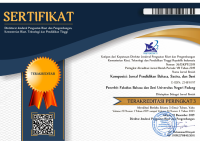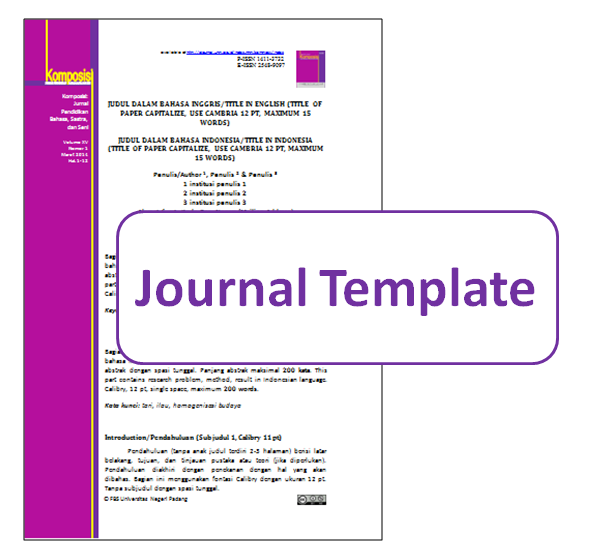The PDF file you selected should load here if your Web browser has a PDF reader plug-in installed (for example, a recent version of Adobe Acrobat Reader ).
If you would like more information about how to print, save, and work with PDFs, Highwire Press provides a helpful Frequently Asked Questions about PDFs .
Alternatively, you can download the PDF file directly to your computer, from where it can be opened using a PDF reader. To download the PDF, click the Download link above.
Fullscreen
Fullscreen Off
Refbacks
There are currently no refbacks.
Copyright (c) 2020 Komposisi: Jurnal Pendidikan Bahasa, Sastra, dan Seni
This work is licensed under a
Creative Commons Attribution-NonCommercial 4.0 International License .
Komposisi: Jurnal Pendidikan Bahasa, Sastra, dan Seni , a peer-reviewed online journal in languages, literature, and arts education.
Printed ISSN 1411-3732 , Online ISSN 2548-9097 .
Currently, Komposisi: Jurnal Pendidikan Bahasa, Sastra, dan Seni is indexed by: View My Stats
Visitors since February 2017:
<div class="statcounter"><a title="web analytics" href="http://statcounter.com/" target="_blank"><img class="statcounter" src="//c.statcounter.com/11239717/0/d5796c6b/0/" alt="web analytics"></a></div> View My Stats
Published by:
Universitas Negeri Padang (UNP) Address: Faculty of Languages and Arts (FBS) Universitas Negeri Padang. Jl Prof. Dr. Hamka Air Tawar Barat, Padang - West Sumatera -Indonesia Telp/Fax. +62751 7053363 Home page: http://ejournal.unp.ac.id/index.php/komposisi | e-mail:komposisi.fbsunp @ fbs.unp.ac.id | cc: havid_a @ fbs.unp.ac.id
Server Luar
slot88
King Wood Car Care slot gacor
scam
situs toto
bandar togel
bandar togel
Slot Gacor Hari ini
situs toto
situs toto
toto togel
togel online
topup murah
harapan777
AMDBET
toto togel
slot88
login bayar4d
macau303
slot resmi apk slot online Slot Maxwin
situs toto
sakti55
situs toto felix168
nextogel
NEXTOGEL
NEXTOGEL
NEXTOGEL
NEXTOGEL
NEXTOGEL
NEXTOGEL
NEXTOGEL
NEXTOGEL
NEXTOGEL
NEXTOGEL
NEXTOGEL
NEXTOGEL
NEXTOGEL
NEXTOGEL
NEXTOGEL
NEXTOGEL
NEXTOGEL
NEXTOGEL
NEXTOGEL
NEXTOGEL
NEXTOGEL
NEXTOGEL
NEXTOGEL
NEXTOGEL
NEXTOGEL
NEXTOGEL
NEXTOGEL
NEXTOGEL
NEXTOGEL
NEXTOGEL
NEXTOGEL
JEPETOGEL
JEPETOGEL
JEPETOGEL
JEPETOGEL
KIM369
KIM369
KIM369
KIM369
KIM369
KIM369
KIM369
KIM369
KIM369
KIM369
situs toto toto slot kuntogel
situs toto toto slot sendok88
togel online toto slot https://www.eaglehighplantations.id/
toto macau
slot gacor slot gacor
batak5d toto slot Slot88 www.onscripture.com
slot online
situs toto
situs gacor bandar togel resmi toto togel https://montreallawfirm.com
wild west gold sering pecah
Toto 4D
slot88
toto macau
Situs Toto
Situs Toto
https://mercubuana.org/
Toto 4d
toto 4d
Toto 4D
toto 4d
info rtp akurat malam ini
Wanita Subang Beli mobil dari Nolimit city
rahasia Cuan Aztech Gems
Gatot kaca Buat TKW Jadi jutawan
Rahasia sukses bermain Mahjing wins
harapan princess starlight
Harapan sweet bonanza
taktik gates of olympus xmas
dukungan gates olympus
rahasia sukses bermain mahjong ways
Situs togel
slot gacor 2025
luxury89
Sulebet
sulebet
oja89
basic4d
situs toto togel online
vipbet888
momo128 login
https://garudafood.org/
jpmania mesin128
mesin128
mesin128
oja89
slot gacor
jumat4d slot login
https://pintu-pro.id/
slot gacor
Buat yang suka cari link slot gacor hoki69 maxwin tiap hari, ini tempat yang paling sering gue datengin.
choicehomecontractors.com
sarangslot
slot 4d gacor hari ini
Toto 4D
https://up2m.pkr.ac.id/jepangbet/
slot
simpatitogel
slot gacor hari ini
slot gacor
slot
https://unesa.id/












